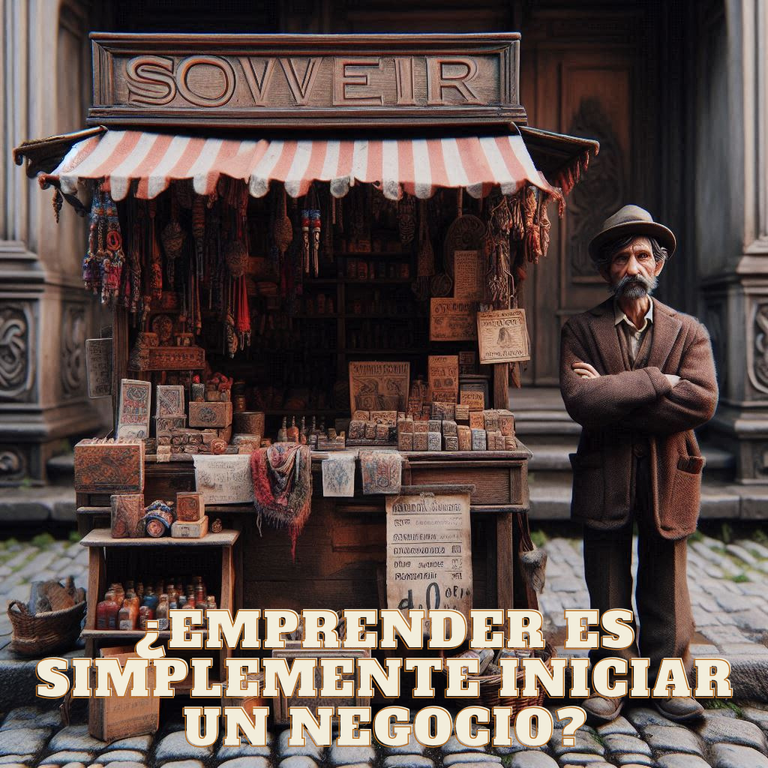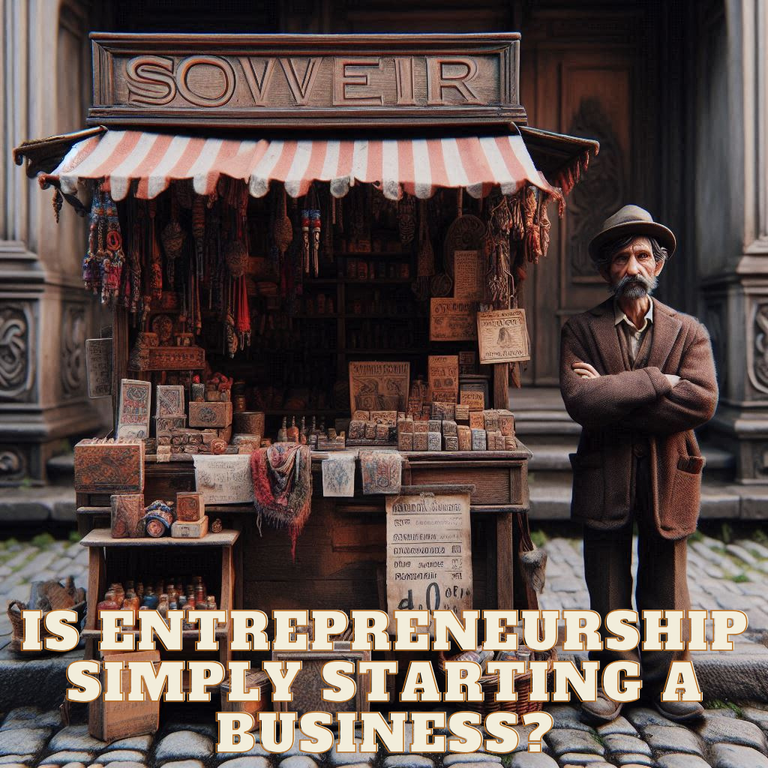¿Emprender es simplemente iniciar un negocio? | Is entrepreneurship simply starting a business? [ES/EN]

Cuando pensamos en las personas emprendedoras, generalmente nos hacemos la idea de alguien que ha empezado un negocio desde cero; un negocio, para más «emprendimiento», por ejemplo, de artesanías o amigable con el medio ambiente. Y hago ese énfasis porque mientras más auténtico o mientras más rompa con el modelo de negocio occidental tan industrializado y desentendido con su impacto ecológico, más se considerará emprendedor por todos los retos y riesgos que supondría, aunque igualmente cualquier pequeño negocio que suponga el inicio de una empresa cabría dentro de dicha categoría. Es decir, el emprendedor o emprendedora será aquella persona con la capacidad suficiente para irrumpir o innovar dentro de un contexto de mercado dado, aprovechando las oportunidades necesarias.
Esto no es casual, nuestra noción actual de la persona emprendedora tiene sus raíces en la década de los 90 con el auge de las startups, cuando se comenzaba a asociar a dicha persona con la capacidad de encontrar oportunidades en el mercado que les permitieran innovar, o lo que es igual, introducir un nuevo producto o servicio que supusiera un cambio en la estructura económica o social. Sin embargo, la palabra emprendedor fue definida por primera vez en el «Diccionario de autoridades» de 1732; primer diccionario de la lengua castellana editado por la Real Academia Española. En él, la definición que aparecía era la siguiente:
«La persona que emprende y se determina a hacer y ejecutar, con resolución y empeño, alguna operación considerable y ardua»
A partir de entonces, con el tiempo, fue tomando matices comerciales que simplificaban cada vez más su significado hasta llegar a lo que hoy entendemos por ello. Pero si volvemos sobre su significado original, veremos que enfatiza en la capacidad para llevar a cabo, con disciplina, alguna acción a sabiendas de que no resultará sencillo. Más aún, una actividad susceptible a ser reconocida por otros como algo admirable. Si vamos al significado actual de la palabra «emprender» en el Diccionario de la Lengua Española, se refiere a:
«Acometer y comenzar una obra, un negocio, un empeño, especialmente si encierran dificultad o peligro.»
A pesar de que aquí está presente la noción comercial, también se toma en cuenta la capacidad de iniciar algo que suponga un reto para quien lo lleva a cabo. Es así como emprender no necesariamente tiene que estar ligado a iniciar un negocio propio, a obtener ganancias económicas, a la noción mercantil, y es precisamente eso lo que me parece justo y necesario rescatar.
¿Pero por qué creo necesario resignificar, nuevamente, nuestra noción de emprender? Pues porque se nos está quedando fuera una gran cantidad de personas igual, o incluso más emprendedoras, que aquellas que solemos reconocer como tal. ¿Acaso cuando nos decidimos a ir a terapia para poder superar nuestro sufrimiento no es emprender? ¿Acaso no lo es decidir a cualquier edad hacer una carrera universitaria? ¿Emigrar y empezar de cero en cualquier otro país huyéndole al nuestro natal? ¿Decidir crear una familia? Como estas, se pudieran citar muchas otras situaciones en las que las personas deciden marcar un punto de ruptura y continuidad en sus vidas, para lograr metas superiores que no necesariamente tienen que estar relacionadas con lo monetario o mercantil. Además, muchas veces aquellos «emprendimientos» que solemos reconocer, ni siquiera lo son tanto porque lo único que consiguen es repetir un mismo esquema de mercado sin introducir nada nuevo.
Por otro lado, -y asociado a las ganancias económicas-, tenemos nuestros estándares de éxito bajo los cuales juzgamos a las personas emprendedoras: el éxito económico siempre va a estar ahí. Sin embargo, una persona exitosa puede ser realmente cualquiera que logre sus propias metas en base a sus propias aspiraciones personales, independientemente de si cumple o no con el esquema de éxito que hemos incorporado debido al consumismo feroz que nos trae el capitalismo más rancio. El éxito no puede estar definido solamente por la persona que tiene un buen trabajo, una buena entrada de ingresos económicos, un buen estatus social, un gran capital de bienes materiales y toda esa parafernalia hollywoodense. No, el éxito parte de quienes se lanzan fuera de la zona de confort en busca de superación personal que puede estar dada tanto en lo económico, como en lo subjetivo, en lo profesional, en lo familiar, en lo artístico, etc.
Por tanto, emprender no puede ser simplemente iniciar un negocio, porque sería demasiado simplista y echaría por tierra todos los esfuerzos del resto de personas magníficas que se levantan cada día con un sueño entre cejas, y que se deja el alma en cada batalla que suponga luchar por hacerlos posible. Sueños que pueden ir desde levantarse de la cama por primera vez en meses, hasta viajar por el mundo o montar un refugio para animales. Estamos rodeados de gente emprendedora que han logrado mucho, muchísimo, pero que han quedado invisibilizadas por culpa de un ideal de éxito que les queda grande, y es que no existe el éxito como tal, sino personas exitosas; personas cuyo éxito queda respaldado porque se han superado a sí mismas y han roto su marca personal, la única marca que nos debiera importar para crecer.
English version

When we think of entrepreneurs, we usually think of someone who has started a business from scratch; a business, for more "entrepreneurship", for example, of handicrafts or environmentally friendly. And I emphasize this because the more authentic or the more it breaks with the Western business model so industrialized and disregarded with its ecological impact, the more it will be considered entrepreneurial for all the challenges and risks it would entail, although equally any small business that involves the start of a company would fit into that category. In other words, the entrepreneur will be the person with sufficient capacity to break into or innovate within a given market context, taking advantage of the necessary opportunities.
This is no coincidence, our current notion of the entrepreneur has its roots in the 90s with the rise of the startups, when this person began to be associated with the ability to find opportunities in the market that would allow them to innovate, or what is the same, to introduce a new product or service that would mean a change in the economic or social structure. However, the word "entrepreneur" was defined for the first time in the "Diccionario de autoridades" of 1732, the first dictionary of the Spanish language published by the Royal Spanish Academy. In it, the definition that appeared was the following:
"The person who undertakes and is determined to do and execute, with resolution and determination, some considerable and arduous operation".
From then on, over time, it took on commercial nuances that increasingly simplified its meaning until it reached what we understand it to mean today. But if we go back to its original meaning, we will see that it emphasizes the capacity to carry out, with discipline, some action knowing that it will not be easy. Moreover, an activity likely to be recognized by others as something admirable. If we go to the actual meaning of the word "emprender" in the Diccionario de la Lengua Española, it refers to:
"To undertake and begin a work, a business, an endeavor, especially if they involve difficulty or danger".
Although the commercial notion is present here, it also takes into account the ability to initiate something that represents a challenge for the one who carries it out. Thus, entrepreneurship does not necessarily have to be linked to starting one's own business, to obtaining economic profits, to the mercantile notion, and that is precisely what I think is fair and necessary to rescue.
But why do I think it is necessary to redefine, once again, our notion of entrepreneurship? Well, because we are leaving out a great number of people who are just as, or even more entrepreneurial, than those we usually recognize as such. Is it not entrepreneurship when we decide to go to therapy to overcome our suffering? Is it not entrepreneurship when we decide at any age to pursue a university career? To emigrate and start from scratch in any other country, fleeing from our native country? To decide to create a family? Like these, there are many other situations in which people decide to mark a point of rupture and continuity in their lives, to achieve higher goals that do not necessarily have to be related to the monetary or mercantile. Moreover, many times those "ventures" that we usually recognize, are not even that much because all they achieve is to repeat the same market scheme without introducing anything new.
On the other hand, and associated with economic gains, we have our standards of success by which we judge entrepreneurs: economic success will always be there. However, a successful person can really be anyone who achieves his or her own goals based on his or her own personal aspirations, regardless of whether or not he or she complies with the scheme of success that we have incorporated due to the fierce consumerism brought to us by the most rancid capitalism. Success cannot be defined only by the person who has a good job, a good income, a good social status, a large capital of material goods and all that Hollywood paraphernalia. No, success is based on those who launch themselves out of the comfort zone in search of personal improvement that can be given both economically and subjectively, professionally, in the family, artistically, etc.
Therefore, entrepreneurship cannot be simply starting a business, because it would be too simplistic and would ruin all the efforts of all the other great people who wake up every day with a dream between their eyebrows, and who leave their souls in every battle to make it possible. Dreams that can range from getting out of bed for the first time in months, to traveling the world or setting up an animal shelter. We are surrounded by enterprising people who have achieved a lot, very much, but who have been made invisible because of an ideal of success that is too big for them, and there is no such thing as success as such, but successful people; people whose success is supported because they have surpassed themselves and have broken their personal brand, the only brand that should matter to us in order to grow.

Créditos | Credits
Imágenes utilizadas | Images used
Todas las imágenes utilizadas son de mi propiedad y fueron generadas utilizando Copilot de Bing y editadas en Canva | All images used are my own property and were generated using Copilot from Bing and were edited using Canva.
Traducción | Translation
Te puede interesar | You may be interested in
El amor no lo puede todo | Love can't do everything [ES/EN]
El llanto como forma de validarnos | Crying as a way to validate ourselves [ES/EN]
¿Depresión de alto funcionamiento? | High-functioning depression? [ES/EN]
Sigamos hablando del autocuidado | Let's keep talking about self-care [ES/EN]
¿Las media naranjas ruedan? | Does half oranges roll? [ES/EN]
¿Conoces el «porno» de productividad? | Do you know about productivity "porn"? [ES/EN]


¡Felicidades! Esta publicación obtuvo upvote y fue compartido por @la-colmena, un proyecto de Curación Manual para la comunidad hispana de Hive que cuenta con el respaldo de @curie.
Si te gusta el trabajo que hacemos, te invitamos a darle tu voto a este comentario y a votar como testigo por La Colmena.
Si quieres saber más sobre nuestro proyecto, te invitamos a acompañarnos en nuestro servidor de Discord.
Excelente publicación para reflexionar y cambiar etiquetas que muchas veces se quedan en lo aparentemente más talentoso, exitoso, dejando muchas veces un estándar alto, a los que pocos pueden llegar porque necesitan recursos económicos. Pero resignificar el término es necesario, incluso para aquellos emprendimientos que tienen índices de vulnerabilidad, pero igual, están emprendiendo.
Gracias Diane, a ver cuándo nos iluminas con algo tuyo de nuevo por acá 😁.
Espero que pronto 🤗
Congratulations @genrigp! You have completed the following achievement on the Hive blockchain And have been rewarded with New badge(s)
Your next target is to reach 15000 upvotes.
You can view your badges on your board and compare yourself to others in the Ranking
If you no longer want to receive notifications, reply to this comment with the word
STOPSaludos
@tipu curate 3
Upvoted 👌 (Mana: 0/75) Liquid rewards.
Muchas gracias ☺️🙏🏻. Saludos